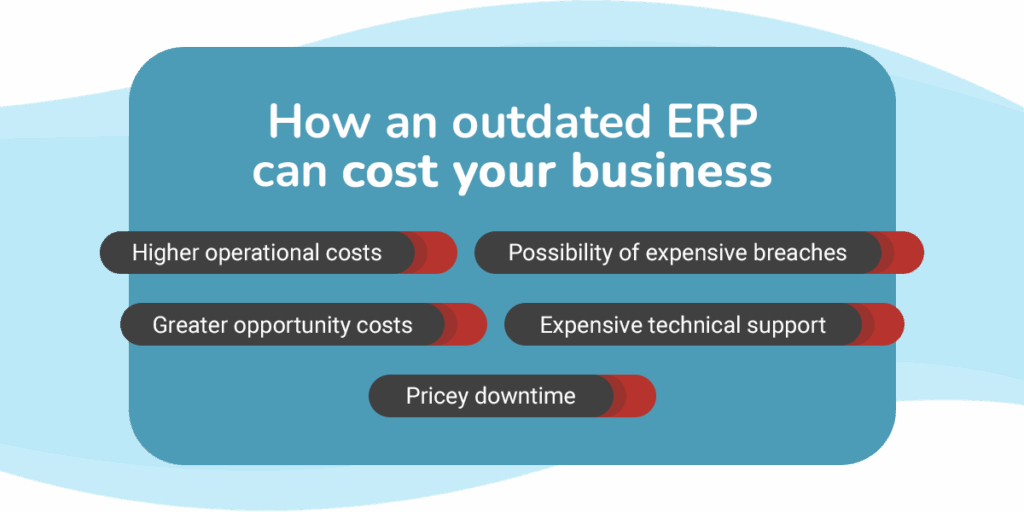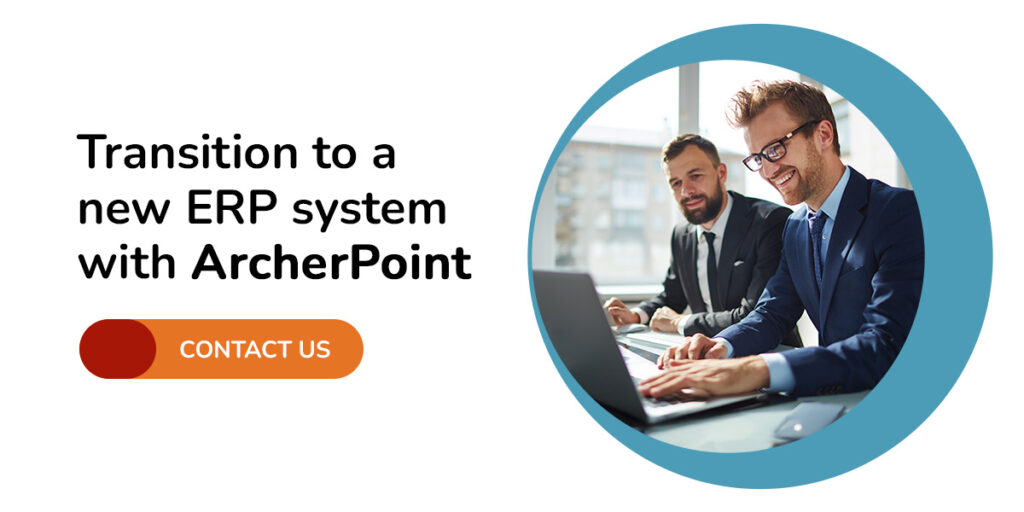The Cost of Outdated ERP Systems: Why Upgrading Matters

Did you know that the estimated cost of poor-quality software in the United States is $2.41 trillion as of 2022? Keeping up with system maintenance can be tricky for any business, but real costs arise when technology isn’t managed properly. Sticking to legacy software can directly impact your company’s efficiency, security, compliance, and productivity, just to name some factors.
If your business is currently running an outdated enterprise resource planning (ERP) system, you may be curious about why and when you should update it. For most organizations, the answer is likely sooner rather than later. Learn more about ERP system maintenance and the cost of outdated systems here.
Top impacts of neglecting ERP upgrades
An outdated, legacy ERP system can have several negative effects on your business, all of which have apparent and hidden costs. A few of the top impacts of avoiding ERP maintenance include:
1. Security vulnerabilities
An outdated ERP system typically lacks the improved security measures of the newest version. Every software update includes important patches and fixes that help protect your system against breaches and other security issues. Maintaining an old system can open your business to cyber threats that result in financial losses, compliance issues, and reputational damage. If your ERP provider considers your current system obsolete, they may be unable to support you in the event of an attack.
2. Missing essential features & functions
With every new software update comes additional features and functions that can streamline your team’s daily work. For example, your legacy system may have outdated data processing capabilities that hinder productivity. Keeping your ERP system outdated can also affect the other technologies your company relies on. The older ERP version you’re running may not be compatible with newer operating systems, impacting your ability to keep your entire technology framework updated, protected, and easy to use.
3. Scaling difficulties
One of the biggest impacts of a lack of ERP maintenance is being unable to scale. As your business grows, so do its technology needs — you may need to accommodate new products, more customers and vendors, and additional markets. An outdated ERP software isn’t a great match for increasing demands. When you get to the point where your ERP simply isn’t enough anymore, you’ll need to invest in revamping your entire framework.
4. Data inaccuracies
Over time, it becomes more difficult to manage data with outdated software. A legacy ERP is more prone to data errors, duplication, inconsistencies, and disorganization. These outdated systems typically have less comprehensive data validation rules and limited or no audit trails. Plus, software bugs are more likely in outdated systems, potentially corrupting data altogether. As it becomes harder to maintain data in the ERP, tasks like reporting and tracking become unnecessarily inaccurate and complex.
5. Lack of support
Depending on the ERP system’s age, the vendor may no longer provide support for it. In some cases, it may even become completely obsolete. For example, Microsoft is phasing out support and updates for Microsoft Dynamics GP in 2029. Microsoft Dynamics 365 Business Central will become Microsoft’s main ERP offering.
If your software goes down, you may struggle to receive the technical assistance you need to get things running. This lack of support often leads to significant downtime. As operations temporarily stop, clients and customers may feel frustrated with your business, and you’ll likely spend resources and time getting back up to speed.
How an outdated ERP can cost your business

There are many reasons why companies choose not to update their legacy ERPs. Some may be hesitant to invest resources into updating their systems, and others might feel uncomfortable with the idea of switching to a new ERP. No matter the case, it’s crucial to understand that failing to upgrade ERP systems can cost your business considerably.
Consider the following examples of how legacy software might be increasing expenses for your company:
- Higher operational costs: Compared to investing in new software, running an outdated ERP system tends to be expensive in the long run. As you spend more time working around issues and inefficiencies, the cost of updating your ERP looks more and more like a cost-saving measure.
- Possibility of expensive breaches: Just one security issue can result in significant losses for your company. According to IBM, the global average cost of a data breach was $4.9 million in 2024. ERP maintenance costs much less and has the added benefits of providing greater security, productivity, and overall peace of mind.
- Greater opportunity costs: Today’s ERP solutions come with a suite of capabilities that drive businesses forward. What might your team be missing out on because of your outdated ERP? These opportunity costs can add up quickly, preventing your organization from evolving and maintaining a competitive edge.
- Expensive technical support: Since vendors generally stop supporting software as it ages, you may spend significant time and resources getting the technical help you need. The fees to hire professionals with specialized knowledge to support your system will likely be greater than updating to a new ERP.
- Pricey downtime: An older system is more prone to technical issues, and downtime can be seriously expensive. When a system failure happens, productivity comes to a halt, and you may be unable to meet your clients’ or customers’ needs. Every moment of downtime contributes to revenue loss.
Transitioning to a new ERP system with ArcherPoint
Is it time to upgrade your ERP? If you’re thinking of switching to a modern ERP system that can support your company with greater efficiency, protection, and growth opportunities, ArcherPoint can help make the transition seamless. As a Certified Microsoft Dynamics ERP Solutions Partner, our experienced team offers Microsoft ERP services for businesses in various industries.
By partnering with us, you can upgrade your ERP system to Dynamics 365 Business Central. This comprehensive, cloud-based ERP comes with hundreds of features for managing finances, operations, projects, services, and supply chains. Together, we’ll figure out your company’s needs and provide expert support to make the integration process simple.
Learn more about our award-winning services and expertise!
Talk to an expert today
Switching to an updated ERP can bring plenty of cost benefits for your company. Whether you’re interested in learning more about when to upgrade your ERP or are ready to get started with the latest version of Business Central, our team is here to help. If you don’t already use Business Central, the ArcherPoint by Cherry Bekaert team can help you navigate the transition. Schedule a free consultation today.

Trending Posts
Stay Informed
Choose Your Preferences
"*required" indicates required fields
